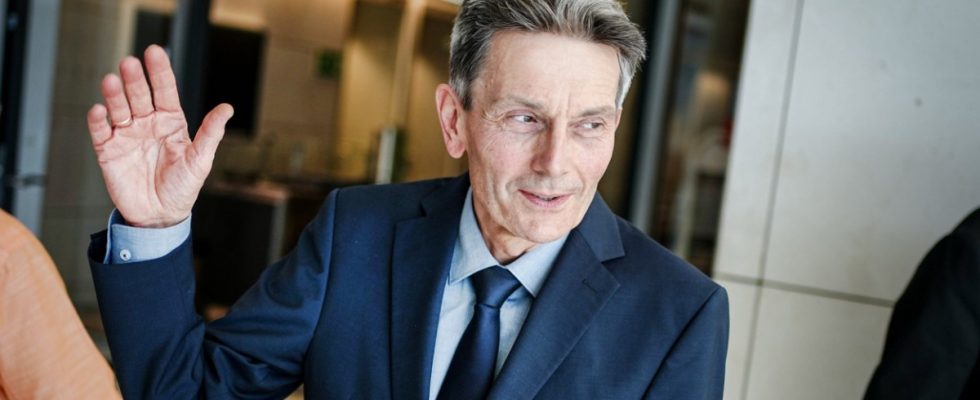With an approval of 94.7 percent, Rolf Mützenich was re-elected chairman of the SPD parliamentary group and should help to lead the coalition into calmer waters. In the election in the meeting of the Bundestag faction on Monday, the 64-year-old received 180 yes votes out of 190 votes cast, nine MPs voted no, and there was also one abstention. He got a slightly worse result than before. He received 97 percent approval in the 2021 election and 96.6 percent in the first election in 2019.
Thus, Mützenich will lead the parliamentary group until at least 2025. After the resignation of party and parliamentary group leader Andrea Nahles, he was initially considered an interim solution, but is now the longest-serving parliamentary group leader of the SPD for more than 30 years, since Hans Jochen-Vogel. Peter Struck has been in office longer, but in two different terms (1998-2002 and 2005-2009). In the current situation, with his calm, compromise-oriented manner, Mützenich is “a stroke of luck” and a “great integrator,” said several SPD deputies after the election of their old and new faction leaders.
There was a clear setback for the parliamentary manager of the parliamentary group Katja Mast. She is responsible for coordinating votes, legislative projects and the agenda with the other parties, but some SPD politicians criticize that she is far too little publicly visible. Mast received just 69.4 percent approval, down from 82.1 percent when she was first elected two years ago. Mast succeeded Carsten Schneider, who had been appointed Federal Government Commissioner for the East.
He already has ideas on how to change the draft budget
Mützenich has become an important support for the chancellor, trying to cast traffic light projects with the FDP and the Greens in the Bundestag into laws that can attract a majority. Olaf Scholz was also present on Monday, after his jogging fall his badly affected right eye was covered with a black eye patch, but the Chancellor was in a good mood in front of the cameras. Since the healing process is likely to take some time, it is planned that the chancellor with the pirate-like eye protection will also appear at the G-20 summit in India, among other things.
Most recently, nervousness had grown in their own ranks because of the poll values - with the decision to help the industry with a state-capped electricity price, the parliamentary group also went against the Chancellor’s line at their retreat in Wiesbaden.
A point of contention in the coming weeks is likely to be the federal budget for the coming year, in which the debt brake is to be complied with again. “We still have ideas on how we as the SPD parliamentary group can change a few things,” said Mützenich before the parliamentary group meeting. The budget will not leave the Bundestag the way the government is bringing it in this week. He still sees “need for change in individual titles”. However, the scope is limited, and there could still be one or two surprises, including with the tax estimate in November.
A seismograph designed to sense possible rebellions
He will continue to fight for an industrial electricity price. “I’m not looking for a fight, I’m looking for solutions,” said Mützenich, describing his style, which he wants to continue. The state shouldn’t run around with a cornucopia when it comes to electricity prices, but try to keep industrial companies in the country with a limited “transformation electricity price”: “We won’t allow Germany to be talked down as a business location either.”
The delivery of is also controversial in the coalition, especially in the SPD Taurus-Cruise missiles to Ukraine so that it can make better progress in the offensive against Russian troops. The Chancellery wants to prevent Russian territory from being attacked. Mützenich, who had long backed a settlement with Russia and underestimated the danger of war, repeatedly warns of the risk of escalation from such arms deliveries.
For Scholz, Mützenich, who comes from a working-class family in Cologne, is also a kind of seismograph when a rebellion against government projects could threaten. He was instrumental in defusing the heating law so that there is more leeway, longer transition periods and higher funding for the replacement of old gas and oil heating systems. The law is now to be passed by the German Bundestag on Friday.
When the executive board was elected, all eight previous deputy parliamentary group leaders stood for re-election: Gabriela Heinrich (focus: foreign affairs, development, defense, human rights); Verena Hubertz (economy, construction, housing, tourism); Matthias Miersch (environment, climate protection, energy, agriculture, consumer protection); Detlef Müller (traffic and digital); Achim Post (household, finance, Europe); Sönke Rix (family, seniors, women and youth, education and research); Dagmar Schmidt (work, social issues, health) and Dirk Wiese (inside, law, petitions, sport, culture).
Rolf Mützenich emphasized that continuity is important, in his opinion the work has been successful so far. But it is becoming apparent that the conflicts in the coalition will not diminish.

